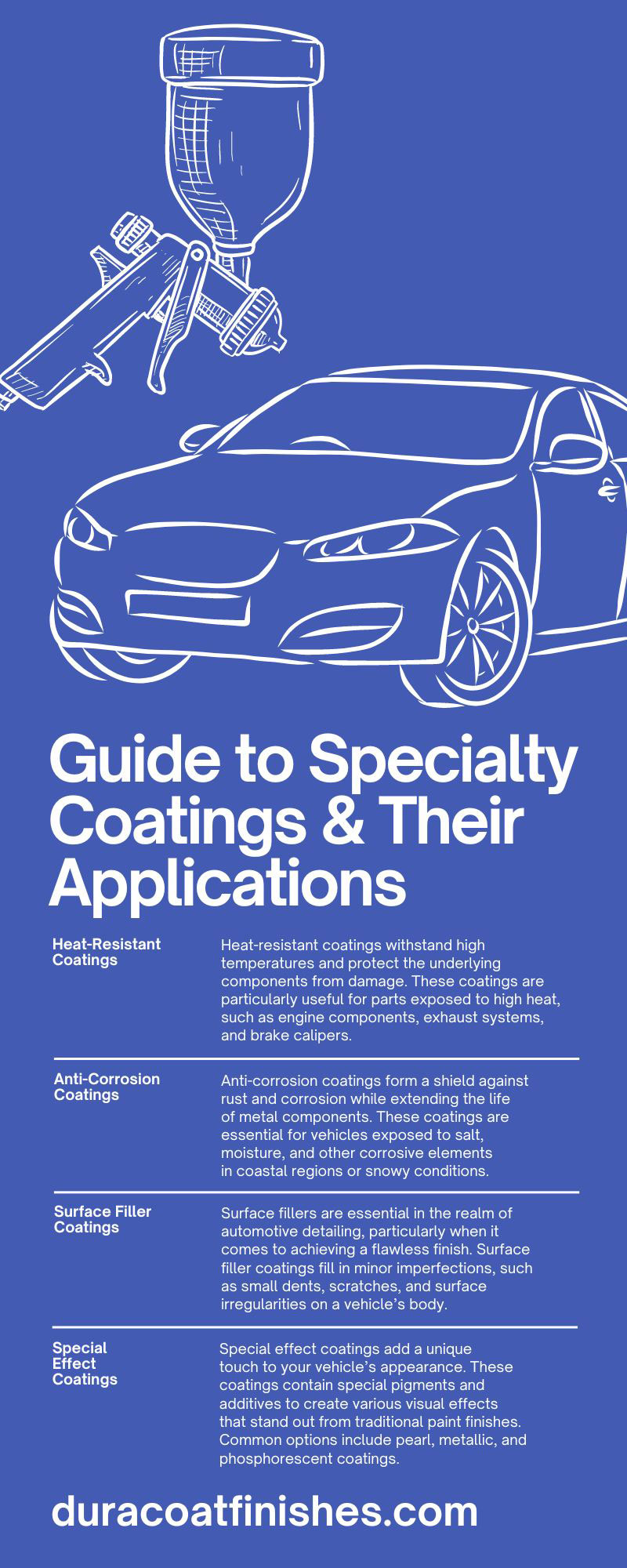Have you ever wondered how some cars maintain their showroom shine for years? The secret lies in specialty automotive coatings. Whether you appreciate aesthetics and want your vehicle to last, understanding these coatings can elevate your vehicle maintenance game. With this guide to specialty automotive coatings, their various types, benefits, and applications, you’ll have a comprehensive understanding of how they can transform your ride.
Specialty Coatings vs. Regular Automotive Paint
Understanding the difference between specialty coatings and regular automotive paint is crucial for getting a finished product you can be proud of. Regular automotive paint is primarily for aesthetics and protection against rust. While it provides a decent level of protection, it is susceptible to scratches, UV damage, and chemical stains.
On the other hand, specialty paint coatings offer superior protection. They form a hard, protective layer over the paint, safeguarding it against environmental hazards. Unlike regular paint, these coatings can withstand harsh conditions, making them ideal for long-term use. Furthermore, specialty coatings enhance the paint’s appearance, giving it a glossy, mirror-like finish. This not only makes the car look stunning but also increases its resale value!
Benefits of Specialty Coatings for Vehicles
Superior Protection
One of the primary benefits of specialty coatings is the superior protection they offer. They create a hard, protective barrier that shields the paint from scratches, UV rays, and chemical stains. They also ensure your car’s paint remains in pristine condition for years.
Enhanced Appearance
Specialty coatings enhance the car’s appearance by providing a deep, glossy finish. This mirror-like shine makes the car look stunning, increases its aesthetic appeal, and potentially boosts the car’s resale value.
Easy Maintenance
Another significant benefit is the ease of maintenance. Specialty coatings make the surface hydrophobic, meaning water, dirt, and grime slide off easily. This makes cleaning the car a breeze, reducing the effort and time required for maintenance.
Types of Specialty Coatings
Heat-Resistant Coatings
Heat-resistant coatings withstand high temperatures and protect the underlying components from damage. These coatings are particularly useful for parts exposed to high heat, such as engine components, exhaust systems, and brake calipers. By applying heat-resistant coatings, you can enhance the durability and performance of these parts, ensuring they operate efficiently despite the heat.
Anti-Corrosion Coatings
Anti-corrosion coatings form a shield against rust and corrosion while extending the life of metal components. These coatings are essential for vehicles exposed to salt, moisture, and other corrosive elements in coastal regions or snowy conditions. Anti-corrosion coatings prevent the onset and spread of rust, maintaining the structural integrity and appearance of the vehicle.
Surface Filler Coatings
Surface fillers are essential in the realm of automotive detailing, particularly when it comes to achieving a flawless finish. Surface filler coatings fill in minor imperfections, such as small dents, scratches, and surface irregularities on a vehicle’s body. By creating an even surface, surface fillers ensure the subsequent layers of paint or coatings adhere well and look good.
Special Effect Coatings
Special effect coatings add a unique touch to your vehicle’s appearance. These coatings contain special pigments and additives to create various visual effects that stand out from traditional paint finishes. Common options include pearl, metallic, and phosphorescent coatings. Whether you’re looking to add personality to your car or make a bold statement, special effect coatings can help you achieve stunning and distinctive results.
Applications for Specialty Coatings
Paint
The primary application of specialty coatings is paint protection. They form a hard, protective layer over the paint, safeguarding it against environmental hazards. This ensures the paint remains in pristine condition for years.
Wheels
You can even apply specialty coatings to wheels! They shield the wheels from brake dust, road grime, and other contaminants, which makes cleaning the wheels easy and keeps them in good condition.
Glass and Interior Surfaces
Did you know you can apply specialty coatings to glass and interior surfaces? They provide a protective layer that repels water, dirt, and grime, making cleaning a breeze! The glass will remain clear, and the interior surfaces will remain in good condition.
Underbody
The underbody of a vehicle is exposed to extremely harsh conditions, including road salt, gravel, and water. Specialty coatings designed for the underbody can provide a barrier that prevents rust and corrosion, prolong the life of the vehicle, and support its structural integrity.
Headlights and Taillights
Specialty coatings on headlights and taillights protect against UV damage, yellowing, and minor scratches. Keeping the lights clear and free from damage ensures they remain bright and functional, contributing to safe driving conditions.
How To Apply Coatings
Professional Application
Professional application is the ideal method for applying specialty coatings because auto body technicians have the necessary skills, experience, and tools for a flawless application. Also, they may offer a warranty, providing confidence in their quality of work.
DIY Application
If you prefer a hands-on approach, a DIY application is an option. Many specialty coatings come with detailed instructions, making it possible to apply them at home. Follow the instructions carefully to ensure a successful application.
Choosing the Right Method
Choosing between professional and DIY applications depends on your skills, experience, and budget. While professional application offers a flawless finish, DIY application can be a rewarding experience for those confident in their abilities.
Maintenance and Longevity of Coatings
Regular Maintenance
Regular maintenance is crucial for the longevity of specialty coatings. This includes washing the car regularly with products designed for coated surfaces. Avoid using abrasive cleaners and brushes, as they can damage the coating.
Annual Inspections
Annual inspections by auto body professionals can help you identify issues with the coating. Professionals can reapply the coating if necessary, ensuring it remains in good condition. This extends the lifespan of the coating and provides maximum protection.
Longevity
The longevity of specialty coatings varies based on the type and maintenance. Ceramic coatings can last up to five years, while polymer coatings typically last for a year. Remember, regular maintenance and annual inspections can extend the lifespan of the coating.
The Future of Automotive Care
Specialty automotive coatings are the future of car care. They offer superior protection, enhance the car’s appearance, and make maintenance easier. Whether you’re a car detailing professional or a DIY mechanic, understanding these specialty coatings and their applications can elevate your maintenance game and help you protect your vehicle.


